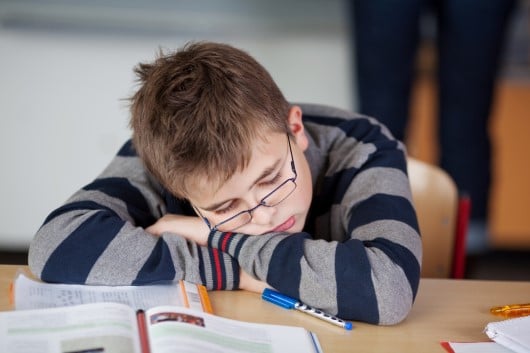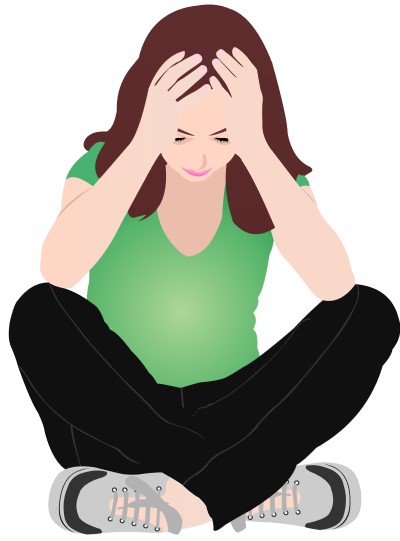
Student Sleep Resources
Teens today are not getting enough sleep which can affect their mood, health, and performance at school. On this page you’ll find a variety student sleep resources including tips, recommendations, and links to more in depth information.
A) Students not getting enough sleep
Students not getting enough sleep:
The sleep deprivation epidemic among teens (American Academy of Pediatrics):
- 73% of high school students across 30 states are not getting enough sleep
- 58% of middle school students surveyed not meeting sleep recommendations

Many health-risk behaviors are associated with poor teen sleep (National Sleep Foundation):
- Drinking soft drinks
- Lack of physical activity
- Excessive computer use
- Getting in fights
- Smoking cigarettes
- Smoking marijuana
- Drinking alcohol
- Sexual activity
- Feeling sad or hopeless
- Seriously considering suicide

Why teenagers are not getting enough sleep (Nationwide Children’s Hospital):
- Shift in sleep schedule – After puberty, there is a biological shift in an adolescent’s internal clock of about 2 hours.
- Early school start times – Some high schools start as early as 7:00 AM.
- Too many obligations – Homework, sports, after-school, and socializing lead to late bedtimes.
According to the CDC, children and adolescents who don’t get enough sleep are at higher risk for health issues including obesity, diabetes, and injuries.
They’re also at more risk for mental health challenges, attention and behavior problems, and poor academic performance.
Source: US CDC
B) How much sleep does my child need?
How much sleep does my child need?
How much sleep someone needs depends on their age:
- 6–12 years should regularly sleep 9–12 hours
- 13–18 years should sleep 8–10 hours
C) Tips to help students sleep better
Tips to help students sleep better:
Get adequate sleep
Make sure you’re getting what your body needs
Physical activity
30 to 60 minutes multiple times a week can lead to better sleep
Limit caffeine intake
Soda pops and energy drinks may be popular among teens, but they should be avoided in the evening.
Avoid going to bed hungry
Try a light healthy snack
Avoid nicotine
It’s not just cigarettes these days, vaping has become popular among teens. The nicotine from both can disturb sleep.
Maintain a regular pre-bedtime routine
Activities such as light reading and relaxing music can help them prepare for sleep.
Set up a great bedroom environment
Keep it cool, dark, and quiet
Limit electronic screens at bedtime
Computer games, going online, or watching their favorite TV show can make it harder to fall asleep.
Smart phones, tablets, and TV screens emit bright blue light which has been shown to interfere with body’s natural sleep-wake cycles.
Maintain a regular sleep schedule
To keep their sleep cycles on track, they should go to bed and wake up the same time everyday.
Avoid sleeping in on the weekends
Sleep in too late on Saturday and Sunday can make it hard to stay on schedule Sunday night.
Try afternoon naps
Short naps in the early afternoon may be beneficial.
Get help
If they’re having ongoing problems falling asleep, snoring, or overtired during during the day, it’s a good idea to talk to a doctor.
D) Sleep disorders in kids & adolescents
Sleep disorders in kids & adolescents:
Common Sleep Problems: PLMD, PLS, sleep apnea, narcolepsy, sleepwalking (TeensHealth)
Sleepwalking and Sleep Terrors (Harvard Health)
Sleep Apnea in Children (Healthline)
Narcolepsy in Children (Cleveland Clinic)
Restless Leg Syndrome and Periodic Limb Movement Disorders (Cincinnati Children’s Hospital)
E) More student sleep resources
More student sleep resources:
A Parent’s Guide to Surviving the Teen Years (KidsHealth)
Help for Parents of Troubled Teens (HelpGuide)
13 Tips for Parenting a Teen With ADHD (MedicineNet)
Teenage Depression: Signs and How to Get Help (AddictionRehabTreatment.com)
4 Signs of burnout in your teen (MyTutor)
Learning:
Homework and Study Habits: Tips for Kids and Teenagers (Parenting Today)
The Screen Time Diet: helping your teen find the balance with tech (MyTutor)
SCREEN TIME FOR KIDS: A GUIDE FOR PARENTS & EDUCATORS (Bradley University)
F) Organizations
Organizations:
Last updated: 2/25/2024
Connect with us:
About Us
Better Sleep Simplified® was founded as a place for you to get clear and well-researched information.
Our goal is to make sure you know about your options so that you take action sooner rather than later.
Check us out on YouTube:
Watch and Learn
Helpful sleep tips, interesting sleep facts and statistics you want to know about
Affiliate Disclosure
This site is a participant in the Amazon Services LLC Associates Program and other affiliate advertising programs designed to provide a means for sites to earn advertising fees by advertising and linking to them.
Important: BetterSleepSimplified.com is for informational purposes only and is not intended or implied to be a substitute for professional medical advice, diagnosis, or treatment. Always consult a physician for sleep and health concerns. See additional information.
